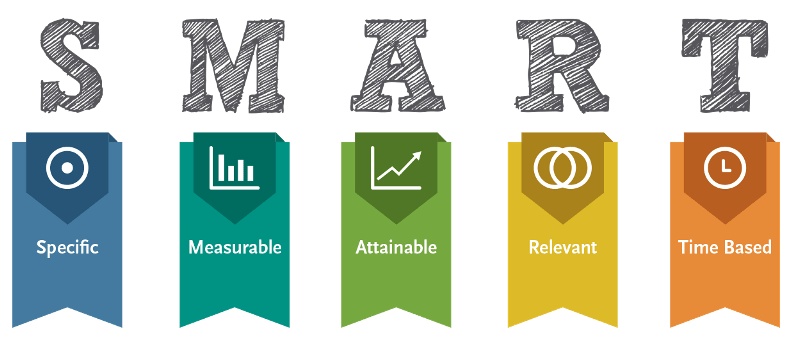

The key to making the leap from an OKAY crowdfunding campaign to a GREAT crowdfunding campaign is to create a checklist BEFORE starting to fill-in campaign details. After analyzing thousands of crowdfunding campaigns, the Giviki team has created a 5-part checklist for creating a GREAT crowdfunding campaign.
Set aside just 30 minutes to go through these 5 steps before publishing your crowdfunding campaign, and you will have much better fundraising results.
- Fundraising Goal: SMART — Specific, Measurable, Attainable, Relevant, Time-based.
- Campaign Title: SIGNIFICANT — Urgent and Important.
- Campaign Image: BRANDED — High quality, beneficiary focused, consistent.
- Campaign Story: STORIFY — Situation, Twist, Outcome, Relevance, Impact, Feelings, You.
- Campaign Updates: RETENTION — Communicating gratitude and impact.
1. Fundraising Goal: SMART
The SMART framework provides guidance on how to create a realistic fundraising goal for your cause and a believable fundraising goal for your donors. SMART stands for ‘Specific, Measurable, Attainable, Relevant, Time-based’.
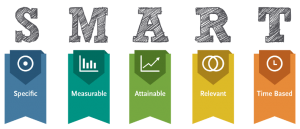
Specific
The very first step of creating a fundraising goal is to specify who your organization is helping and how your organization will help. Specific fundraising goals help create clarity not only for using the funds but also for providing transparency to donors. Trust is the single-most-important criteria for donors, so do everything you can to establish a sense of trust in your fundraising!
For example:
- We want to help support women who are victims of domestic violence (who)
by providing counselling support (how). - We want to fundraise to house more abandoned pets (who)
by supporting the renovation of an animal shelter (how).
Measurable
Let’s take transparency and trust to the next level – make your specific goals, measurable!
- Fundraise $50,000 to support 500 women who are victims of domestic violence.
- Fundraise $10,000 to renovate the animal shelter so that 100 more abandoned pets can have a home.
Measurable goals are useful because they help measure momentum. Momentum helps communicate progress, which motivates team members and inspires donors to give. Thus, measurable goals are important for fundraising, for all organizations, of any size.
Attainable
After you have created a measurable and specific goal, test to see if the goal is attainable. Attainable goals should be challenging and achievable.
Many charities and social enterprises are motivated by a desire to do good. However, a desire to do good unchecked by reality can result in setting goals that may demotivate your team members. Goals that are too easy to achieve may not satisfying, but goals that are not feasible can make people feel inadequate.
Create stretch goals — especially since crowdfunding campaigns are designed to be urgent appeals for important causes.
You can use data from past campaigns and do an inventory check on your current resources to understand the achievability of your goals. To understand what’s achievable for your nonprofit, consider:
- The success of your previous fundraising campaigns — increase your past successful fundraising goals by
25-50% to challenge yourself. - Calculating a forecast: fundraising = the average number of donors x the average donation size.
- Time-frame: how long do you have to fundraise, and when are you fundraising? For months such as December when donors tend to give more, you may want to increase your goals.
- What current resources do you have to help you raise more? For example, do you have more or fewer volunteers to help spread campaign awareness? More or fewer employees to engage existing donors? If you have more resources than when you had launched your previous campaigns, increase your goals; if you have fewer resources, consider decreasing your goals.
Relevant
Crowdfunding campaigns are story-driven or time-bound appeals that allow donors to share on social media and fundraise on your behalf. They are best for collecting one-time donations from a large number of new donors, i.e. a target audience that has yet to develop a strong relationship with your cause.
In addition to raising more funds, the goal of a crowdfunding campaign is to raise more awareness for your cause. Your crowdfunding campaign could be the first contact a new donor has with your organization, so make sure your specific, measurable, and attainable goal relate to your organizational mission and vision.
Case example (name of the charity was not disclosed for privacy reasons): a local charity crowdfunded to provide international relief for the Australian Bushfires in 2019.
- This viral campaign brought in many new donors for the charity, but these donors thought that the charity supported international relief only.
- In reality, the charity mostly supported local relief programs. Consequently, many donors were confused about the charity’s brand.
Clarifying the unique nature of the campaign to fundraise from locals for international relief while emphasizing the charity’s mission and vision to provide relief for any disasters would have improved communications with donors.
Time-Based
Lastly, create a fundraising deadline. Fundraising deadlines can help you:
- Motivate your team members to hit the target fundraising goal.
- Create a sense of urgency with your donors, which motivates giving.
- Get feedback on whether current fundraising strategies need to be adjusted.
Let’s try to piece a SMART fundraising goal together!
The crowdfunding campaign will begin December 1 and run through December 26.
The fundraising target is to raise $50,000 in order to support 500 women who are victims of domestic violence. The funds will be used to provide counselling support for these women.
Last year’s campaign for providing counselling raised $40,000. Last year, we reached out to 2,000 donors by email, resulting in 400 donations. That means our conversion rate was 400/2,000 = 20%.
We currently have 3,000 donor emails in our database. If we use last year’s conversion rate, about 600 donors will give. Each donor gives $100 on average. Our forecasted fundraising goal is:
on average 600 donors x $100 average donation = $60,000. The $50,000 goal seems to be attainable.
If we reach the $50,000 goal, our nonprofit will be able to make progress in our mission to empower victims and survivors to find safety and live free of abuse.
2. Campaign Title: SIGNIFICANT = Urgent + Important
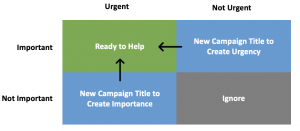

The next step is to create a campaign title!
The SIGNIFICANT framework provides guidance on how to create an attention-grabbing campaign title. SIGNIFICANT means that a campaign title is both urgent and important. Titles should also be short — under 60 characters — because long titles do not fully show up on social media.
Urgent titles express your need, while important titles express why the campaign is relevant to your prospective donors. What is urgent for your cause may not be important to your donors — this distinction is crucial to understand.
A great campaign title is both urgent and important because donors can and want to help, but choosing which campaigns to fund is difficult. There are over 1.4 billion donors that can give to 10 million NGOs worldwide. SIGNIFICANT campaigns that are both urgent to your cause and important to your donors will help your fundraising stand out from the crowd.
Urgency can easily be identified by analyzing which of your social programs need fundraising.
Importance can be identified by analyzing media trends or search result trends because these trends represent the interests of the general public. For example, migrant workers in Singapore became an important trend on Google during the COVID-19 outbreak in 2020, which led to an influx in donations to Giviki crowdfunding campaigns supporting migrant workers.
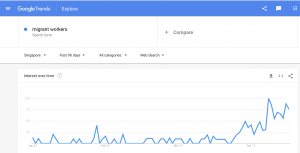

We also recommend the use of trending #hashtags to make your campaign more important to your donors.
Singapore Red Cross partnered with Giviki to raise over $20,000 for feeding local families during the COVID-19 outbreak in 2020. #WeGiveInSolidarity was a hashtag trend for Singaporeans to donate stimulus checks from the government to help other Singaporean families in desperate need of more finances.
In addition to the hashtag, “Gift your unused petrol spend” was a short title that was important and relevant to donors who felt comfortable giving during the COVID-19 pandemic. “To feed a hungry family today” creates a sense of urgency.
This campaign title is a great example of a crowdfunding campaign that is SIGNIFICANT, both urgent and important.
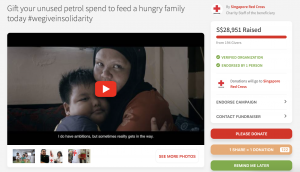

3. Campaign Image: BRANDED
The campaign image is the most important component of a crowdfunding campaign for grabbing a donor’s attention on communication channels such as email or social media.
According to data from Giviki, great campaign images can result in 20% more donations. Giviki’s research shows that great campaign images are BRANDED. There are 3 components of a BRANDED campaign image:
- High-quality photos: use high-resolution images.
- Beneficiary focus: the image should show who you are helping.
- Consistency: landscape images that have words and logos that represent your brand.
No organization should be represented by poor quality images that lack substantive meaning — eliminate any reasons for donors to second-guess their gift. Here are 2 free online tools to improve your brand through high-quality design:
- Unsplash: Stock Photos. Use Unsplash to find high-quality photos if you do not have any on hand.
- Canva: Photo Resizing. Use Canva to resize your photos to better fit social media, email, and even Giviki.
Case example: Babybox Korea partnered with Giviki and the YouTube channel Asian Boss to fundraise over $100,000 in support of the abandoned infants of Korea.
The campaign image was made using a landscape high-quality photo, showing the purpose of the funds raised (helping abandoned infants), with logo and text branding. The Canva tool was used to resize and brand the image.
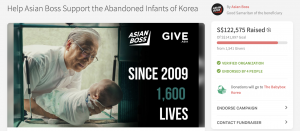

4. Campaign Story: STORIFY
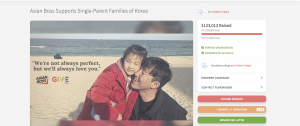

The key to converting more donors to give is telling a great story on the crowdfunding page. A great crowdfunding campaign tells a great story that sparks emotion and builds trust with donors.
The STORIFY framework provides guidance on how to tell an emotional and trustworthy story. STORIFY stands for ‘Situation, Twist, Outcome, Relevance, Impact, Feelings, You’.
- Situation: what is the urgent and important problem, and why can’t the government solve this problem well?
- Twist: what beneficiary story can you tell that shows how people are suffering due to the Situation, and how are you solving this problem?
- Outcome: how are you going to use the funds to combat the Situation and help the beneficiaries?
- Relevance: is the Twist significant to the donor?
- Impact: will your organization use funds to provide a notable difference between the Situation and the Outcome?
- Feelings: can donors empathize with the Twist?
- You: what is your core mission and vision that ties all the other elements of the story together?
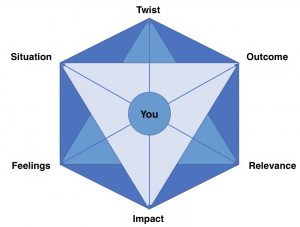

Case Example: A Father’s Heart.
Father’s Heart is a local nonprofit that supports the single parents of Korea. Giviki partnered with Father’s Heart to raise more than $100,000 from 2,000 donors in 1 month.
A great story follows a 3 part plot: the Situation, the Twist, and the Outcome.
Start your campaign story with the Twist, as the Twist is the part of the story that has the most Relevance and Feelings for the donor.
The Twist should explain why your cause was started to change the lives of the people in need. In this campaign, the founder of Father’s heart received generosity from strangers that helped prevent his suicide and pay off his daughter’s urgent medical bills. His nonprofit’s mission is to repay this kindness to other single parents. This Twist was Relevant to parents who have gone through struggles in life, and love their children dearly.
The ‘Situation’ should be a problem that is urgent in need or an important topic in the media. The problem is that single parents in Korea cannot receive post-partum services, which was an issue that raised significant attention in the media.
The ‘Outcome’ should establish trust with donors by outlining how the funds will be used and establish your charity’s brand by highlighting the mission. The Father’s Heart planned on using funds for 3 high-impact objectives based on the founder’s mission of helping other single parents with critical healthcare:
- Provide Medical Aid and Postpartum Care
- Legal Assistance
- Residential Support and Admin Center
Our data shows that most donors spend about 2 minutes on a campaign page, so your campaign story should spark emotion and create trust in 2 minutes. One way to make your campaign page easier to read is to create graphics. You can also use quotes and bolded texts to make certain elements of your story stand out. A shortcut for establishing trust is to use data backed by journalism.
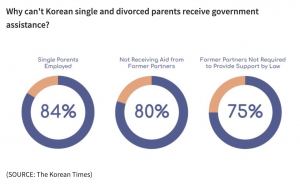

This graphic from the Father’s Heart campaign uses bolded text and graphics to explain the Situation, and cites a Korea Times article for verification.
5. Campaign Updates: RETENTION
FACT: Repeat donors have higher retention rates.
Takeaway: Donors who make a second gift are more likely to continue giving.
Second gift = Thank you + Updates.
Research shows that nonprofits retain ~27% of their new donors, but hold onto ~70% of their repeat donors. This data suggests that two-time donors are more likely to become three-time donors, etc. This means that a little effort after the first gift goes a long way.
RETENTION can be broken down into communicating gratitude and communicating impact.
Communicating Gratitude
Appreciation is the first pillar of donor retention. Giviki provides a tool to send automated donation receipt with a Thank You Message after a donation is made. Use this tool to say a general thank you and creating the opportunity for further connections, i.e. becoming a social media follower.
Here’s an example:
Thank you for joining us in our small effort to support our members affected by the COVID-19 situation.
It is said that great opportunities to help others seldom come, but small ones surround us every day. Nonetheless, we feel it is a great blessing to be surrounded by people like you who have stepped forward to care during this difficult period. Thank you very much for your kindness and generosity.
Your contribution will be disbursed to elderly in need promptly. Please give us about 1 month to process your donation for tax-deductible receipts. ABC’s mission is to make sure the no elderly is left without a meal.
If you would like updates on our journey to help the elderly poor, please follow us @ABC! Meanwhile wishing you and your loved ones good health and peace of mind.
Then, create a Gratitude Strategy before launching your campaign. Designate team members to follow-up with your largest donors within 1 month so that the donation remains relevant.
Once the donations start coming, access your donor database to figure out who your largest donors are. Do your best to retain these donors by following up with a more personal email. You can even ask to follow-up with them over a phone call to thank them in person and ask how you could make their giving experience even better.
Communicating Impact
Communicating impact is the crucial second pillar of donor retention.
Giviki’s update tool automatically emails updates to all donors who contributed to your crowdfunding campaign. Use this tool to provide frequent updates: fundraising milestones, good news, proof of helping beneficiaries. Before you launch your crowdfunding campaign, designate a team member to create an update strategy: what fundraising milestones should we celebrate with your donors? What good news should we share? How can we best illustrate the way we are using the funds to help beneficiaries?
For example, Korea Legacy Committee partnered with Giviki to fundraise $100,000 for the elderly poor and homeless. Providing 2 updates throughout a 1 month time period actually activated new donors to give a second time to the same campaign.
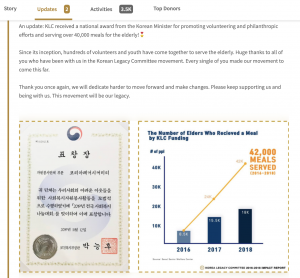

That’s our 5 best practices for creating a great crowdfunding campaign!
If you have any questions, please drop us an email at support@give.asia!



